| Srl | Item |
| 1 |
ID:
120834
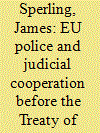

|
|
|
|
|
| Publication |
2013.
|
| Summary/Abstract |
Three key questions arise from the encroachment of the European Union (EU) on national prerogatives in the administration of justice: What factors contribute to the weakest link collective action problem attending police and judicial cooperation within the EU? What were the substantive and institutional goals of the EU in this policy domain? What accounts for the rising level of police and judicial cooperation despite the persistence of barriers to cooperation and incentives to defect? This article first establishes the fundamental incentives and obstacles to cooperation in matters of transnational security threats in post-Westphalian Europe. It then proceeds to explore the evolution of police and judicial cooperation in Justice and Home Affairs between 1999 and 2009, to assess national contributions to police and judicial cooperation, and to consider the potential impact that the changes introduced by the Lisbon Treaty, Stockholm Programme and European Investigation Order. A final question is considered in the conclusion: Did the level and extent of police and judicial cooperation that emerged between 1999 and 2009 give rise to a community of practice that in turn fostered a nascent community of identity resilient enough to mitigate the weakest link technology of public goods production endemic to this policy domain?
|
|
|
|
|
|
|
|
|
|
|
|
|
|
|
|
| 2 |
ID:
172200
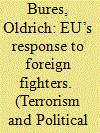

|
|
|
|
|
| Summary/Abstract |
The conflicts in Syria and Iraq have put foreign fighters—individuals travelling from other countries to engage in these conflicts—high on the security agenda at both the national and EU level. Drawing on theoretical arguments previously advanced to explain the haphazard evolution of the EU’s counterterrorism efforts after September 11, 2011, this articles discusses the emergence and persistence of key challenges that have hampered the EU response to security threats posed by 5,000 European foreign fighters between 2013 and early 2017. These include the absence of a common EU-level definition; the differences regarding the scope and perceptions of the threats posed to individual Member States; the lack of consensus on root causes of terrorism and radicalization; and the differences among Member States when it comes to addressing the difficulties of criminal prosecution of foreign fighters.
|
|
|
|
|
|
|
|
|
|
|
|
|
|
|
|
| 3 |
ID:
120827
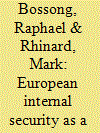

|
|
|
|
|
| Publication |
2013.
|
| Summary/Abstract |
This introduction argues for a new research agenda on European internal security cooperation from the perspective of public goods. We set out our case in three parts. First, we identify new empirical puzzles and demonstrate significant explanatory gaps in the existing internal security literature which public goods theory could help address. Second, we outline the building blocks of a public goods approach and provide an overview of its application, both existing and potentially, in various areas of regional security and European integration. Third, we present three complementary ways of using public goods theory to analyse internal security in the European Union, with the aim of spurring new research questions while accepting some limitations of this theoretical approach.
|
|
|
|
|
|
|
|
|
|
|
|
|
|
|
|
| 4 |
ID:
120833
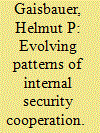

|
|
|
|
|
| Publication |
2013.
|
| Summary/Abstract |
This article discusses evolving patterns of internal security cooperation that start in the realm of international public law and end up more or less entirely in the treaty framework of the European Union. By applying the theory of clubs (Buchanan) it shows the fertility as well as limitations of a public goods approach to analyse and explain such instances of differentiated integration and to assess their effectiveness. By way of the comparative analysis of the Schengen regime and the Prüm Treaty it analyses five main stages of an internal security club's life circle from the causing obstacle (blocking of a certain policy) to the final incorporation endgame. Both clubs under investigation produced so-called network goods with negative rivalry logic, i.e. the more members participate and 'consume' the good the higher the benefit for all. However, it is also shown that club formation and expansion could not only be understood as a strategically rational process, and that various contextual costs inhibited the formation and eventual expansion of the clubs. The article concludes that incorporation efforts necessarily lead to pick-and-choose situations that preclude full uniformity; consequently, outside treaty clubs tend to create á la carte fragmentation to a certain degree.
|
|
|
|
|
|
|
|
|
|
|
|
|
|
|
|
| 5 |
ID:
129973
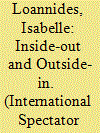

|
|
|
|
|
| Publication |
2014.
|
| Summary/Abstract |
The EU has increasingly intensified the link between its internal and external security concerns and needs, particularly in relation to its neighbours (the Western Balkans and the southern Mediterranean). This adaptation at legal, institutional, strategic and operational levels has sought to improve the coherence and effectiveness of EU external action. Yet, for the Union to tackle ongoing and new challenges in the immediate neighbourhood with today's financial and political constraints, it must be resourceful. The EU should make 'smart' use of its tools and capitalise on existing assets (reinforce the comprehensive approach, strengthen broad-based dialogue on security in the EU members states, and build relations of trust with third countries) to ensure that reforms in the immediate neighbourhood are sustainable, also for the benefit of long-term EU interests.
|
|
|
|
|
|
|
|
|
|
|
|
|
|
|
|
| 6 |
ID:
091884


|
|
|
|
|
| Publication |
2009.
|
| Summary/Abstract |
In this article, we argue that the premature abolishment of the allegedly anachronistic concepts of internal versus external security is of doubtful heuristic value for the study of security practices. The two domains may gradually converge from the perspective of problems, but do so much less in terms of political practices. We show that security policy is pursued according to different systems of rules. It follows distinct institutional logics. We undertake a systematic comparison of policy-making in the European Union's Security and Defence Policy (ESDP) and Justice and Home Affairs (JHA). It is structured along the distinction between making and implementing an agreement as indicative stages of the policy-making process. First, rule-setting asks how decisions are made in the two domains: with or without the inclusion of external actors. Second, we explore whether the implementation of political decisions involves management or enforcement mechanisms. The empirical results are unambiguous: the political actors follow different systems of rules in the two domains. There are still 'ideal-typical' differences in a Weberian sense. This implies that internal and external security may be closely linked, like the opposite sides of the same coin, but must be separated for the purpose of analytical clarity.
|
|
|
|
|
|
|
|
|
|
|
|
|
|
|
|